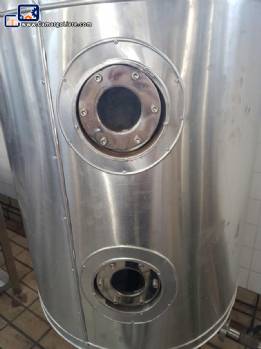Used machines for sale
 Distiller tanks Distiller tanks
Main brands:
|
| Distiller tanks |
A still tank, also known as a still, is used to carry out the distillation process, which is a technique for separating components of a liquid mixture based on differences in volatility. This technique is often used to purify liquids, separate substances from a solution or obtain specific components from a mixture.
What is it for:
Liquid Purification: The still tank is used to purify liquids by removing impurities, contaminants or unwanted components through distillation.
Component Separation: Allows the separation of components of a liquid mixture based on their different boiling temperatures, taking advantage of the distinct volatility properties of each component.
Obtaining Specific Components: It can be used to isolate specific components of a mixture, such as alcohol distillation to obtain different degrees of purity.
Production of Solvents and Chemicals: It is common in the chemical industry to produce solvents, chemicals and pure materials.
How it works:
The basic operation of a distillation tank involves the following steps:
Heating: The liquid mixture is heated inside the distillation tank. The components of the mixture have different boiling points, and heating aims to vaporize the most volatile component.
Vapor Formation: The most volatile component of the mixture reaches its boiling point first, transforming into vapor.
Condensation: The vapor is conveyed to a condensation system, where it is cooled and returns to a liquid state. This condensed liquid, called distillate, is collected.
Distillate Collection: The distillate is collected in separate containers, resulting in the separation of the mixture components.
Process Repetition: The heating, vaporization and condensation process can be repeated several times to obtain greater purity or separate different fractions.
Types of Distillation:
Simple Distillation: Used to separate components with different boiling points, especially when the difference in volatility is significant.
Fractional Distillation: Applied when components have closer boiling points. A fractionation column is added to the system to increase separation efficiency.
Vacuum Distillation: Performed under reduced pressure to reduce the boiling points of the components, allowing the distillation of heat-sensitive substances.
Additional Equipment:
Condenser: Device that cools vapor, condensing it back to liquid.
Fractionation Column: Used in fractional distillation to increase separation efficiency.
Thermostat or Heater: Controls the temperature of the liquid inside the distillation tank.
Collection Vessels: Where the distillate is collected.
Applications:
Chemical Industry: Production of solvents, pure chemicals, and separation of components.
Pharmaceutical Industry: Purification of active substances in medicines.
Food Industry: Production of alcoholic beverages, purification of essential oils.
Laboratories: Chemical analysis and solvent preparation.
Oil Industry: Oil refining and separation of fractions.
Beverage Production: Production of distilled beverages such as whiskey and vodka.
In summary, a distillation tank is an essential component to carry out the distillation process, being applied in various industries to separate, purify and isolate liquid components. |
|
|
|
 |
Distillation tank.
Stainless steel.
Capacity: 500 L.... |
|
|
|
|
Visitation: Schedule date for visitation and check equipment availability. Merely illustrative images.
|
|
|
| |
|
|
Photos and images sent by email will be considered as ad authorization on our websites and marketing.
Camargo Industrial has no responsability for the data delivered by the advertiser, (Operation, technical, maintenance, warranties, technical delivery) and registration of the same data, exempting Camargo Industrial responsibilities on the veracity of the information described, civil and criminally.
The advertiser declares that the equipment is their property, settled without alienation, pending fiscal or judicial attachment.
Standard Work Safety of Machines and Equipment (NR12): 12.1.1. Camargo Industrial does not participate in the use phase construction, transport, assembly, installation, adjustment, operation, cleaning, maintenance, inspection, decommissioning and dismantling of machinery or equipment, any such liability of the seller attributes and / or buyer, relieving - any responsibility Camargo Industrial.
|
 |
| |
|




